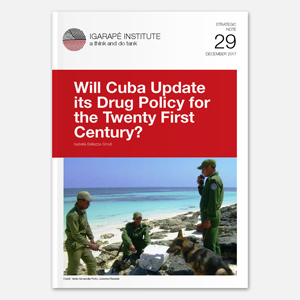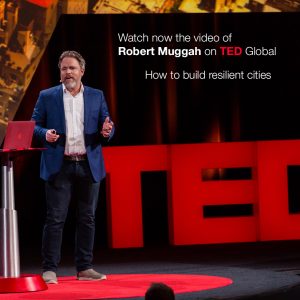
A once-trendy Rio slum is now ‘at war’
The murders in a popular Brazilian favela reflect rising violence in a country in crisis.

The murders in a popular Brazilian favela reflect rising violence in a country in crisis.

[In Spanish] Crímenes que suceden en destinos turísticos de México tienen gran repercusión internacional, pero son parte de un fenómeno de violencia que afecta a todo el país.

En un año, sólo ocho personas fueron sujetas a proceso penal por introducir ilegalmente al país armas de fuego.

Jane Wakefield hears from Rahul Tandon in Kolkata about India’s air pollution nightmare, and from Robert Muggah of the Igarapé Institute in Brazil, who explains how interactive mapping can help pinpoint global pollution hotspots.

Harnessing Trust for Conflict Prevention in Colombia Adriana Erthal Abdenur, in San Vicente del Caguán, Caquetá, Colombia Christmas preparations are in full swing at the church offices in San Vicente del Caguán, in the department of Caquetá. Groups of children sit cross-legged on

In some gang-controlled parts of Rio, just wearing the religious garb of Candomblé or Umbanda is a crime punishable by expulsion.

The UN’s Pre-DDR Experiment Adriana Erthal Abdenur and Giovanna Kuele, Instituto Igarapé Half of the 4.7 million people in the Central African Republic (CAR) currently depend on humanitarian assistance for basic needs, and a full one-fourth of the population has been forcibly displaced. Armed

Current regional mediation efforts in Burundi still provide limited results Gustavo de Carvalho and Priyal Singh In early December 2017, a new round of talks, led by the East African Community (EAC), was initiated in Arusha, with the aim of reaching an agreement to

Violent competition over key trafficking routes erupted in late 2016 after Brazil’s two biggest gangs ended a 23-year truce, notes Robert Muggah, research director at Instituto Igarapé.

Notes from Colombia Adriana Erthal Abdenur, in Agua Bonita, Colombia Nested among the lush green mountains of Caquetá, in the Amazonía region of Colombia, around 200 ex-combatants from the FARC guerrilla group are building a socialist community in the same area where they laid down

New publication by Igarapé Institute discusses possible paths for a Cuban drug policy reform Cuba has one of the lowest violence rates in the Caribbean and Latin America. However, when it comes to drugs, it has one of the more punitive policies in the region

[In spanish] El Foro Económico Mundial, publicó resultados del estudio realizado por expertos del Consejo del Futuro Global dónde dieron su visión de cómo será el mundo en el año 2030.

Lessons from Colombia’s FARC Peace Process Adriana Erthal Abdenur, in Caquetá (Colombia) Humanitarian demining is often presented as a technical component of post-conflict reconstruction and peacebuilding, a painstaking and slow process necessary to avoid the human suffering caused by anti-personnel mines, improvised explosive devices, and

Watch Igarapé Institute research director Robert Muggah keynote presentation in Smart City Expo World Congress 2017.

Burundi’s ongoing political instability highlights the stark divide between global conflict prevention rhetoric and practice Priyal Singh Since the announcement by Burundian President, Pierre Nkurunziza, to run for a controversial third term in early 2015, political instability across the country – marked by

East Timor Initiatives in Guinea-Bissau Adriana Erthal Abdenur, in Bissau Can conflict-affected states effectively support one another in overcoming recurring instability and promoting development and sustaining peace? Timor-Leste’s growing cooperation with Guinea-Bissau suggests that, although incipient, fragile-to-fragile (F2F) cooperation may become a promising

[In spanish] DW habló con dos experts sobre los obstáculos con que se topan a la hora de procesar las estadísticas acerca de los homicídios dolosos en Latinoamérica.

WEF Forum November, 2017 Friday´s savage attack in Egypt is a reminder that the vast majority of terrorist-related killings occur in less well known cities far from the media glare. To be sure, the brutal murder of 305 practicing Sufis in Bir al-Abed represents a

Social Technologies for Peacebuilding? Adriana Erthal Abdenur, in Bissau South-South Cooperation (SSC) often adopts a discourse that is strongly centered on development and that keeps security at arm’s length. However, many SSC partners increasingly undertake cooperation initiatives in conflict-affected or politically unstable

The world’s cities generate more than 75% of global carbon emissions – it’s time for them to play a more prominent role in fighting climate change.

Thomson Reuters Foundation November, 2017 BARCELONA – Many cities are being overwhelmed by growing numbers of people migrating to them, and will become highly vulnerable to floods, storms and other disasters unless authorities receive more support, urban experts said on Wednesday. The proportion of the

A brief glance at Smart City Expo World Congress, which took place in Dubai in November 2017.

What Role in Peacebuilding? Adriana Erthal Abdenur, in Bissau Far from a novelty, South-South Cooperation (SSC) has been in place for half a century in parts of the developing world, including Portuguese-language countries in Africa. A number of SSC development partners are

Regional efforts like those against the LRA and Boko Haram could reinvent continental approaches to conflicts Gustavo de Carvalho and Annette Leijenaar With the increasing use of ad hoc security initiatives in Africa, there is new momentum for the African Pehttps://issafrica.org/author/annette-leijenaaace and Security Architecture (APSA) to

Expert Robert Muggah describes the most dangerous threats faced by modern cities around the world. From climate change to globalization and urbanization cities must adapt to the new challenges of the 21st century.

Here are some of the key talking points and a small selection of the ideas proposed by Seven hundred experts from the World Economic Forum’s “Future Councils”.

10 November, 2017 City specialist and co-founder of the Igarapé Institute, Robert Muggah, sets out six ways for urban centers to address the global migration crisis, terrorism, and climate change. His TED talk “How Cities Can Become More Resilient” was released yesterday, 9 November, and is available here. Watch

November, 2017 Robert Muggah speaks at TED Global NYC. The urban specialist and co-founder of the Igarapé Institute sets out six ways for urban centers to address the global migration crisis, terrorism, and climate change. The TED talk features data from the Earth TimeLapse visualization

the Role of Climate Change in Recurring Violence Giovanna Kuele and Ana Cristina Miola The deadliest blast in Somalia’s history, which killed more than 350 people, and the double car bombing in Mogadishu last October represented frustrating backslides in the country’s efforts to build stability.

Local and international actors should reinforce their support to preventing conflict and sustaining peace in Somalia Omar Mahmood and Gustavo de Carvalho After the attack in central Mogadishu on 14 October 2017, which killed more than 350 people, both traditional and social media seem

O Instituto Igarapé utiliza cookies e outras tecnologias semelhantes para melhorar a sua experiência, de acordo com a nossa Política de Privacidade e nossos Termos de Uso e, ao continuar navegando, você concorda com essas condições.

